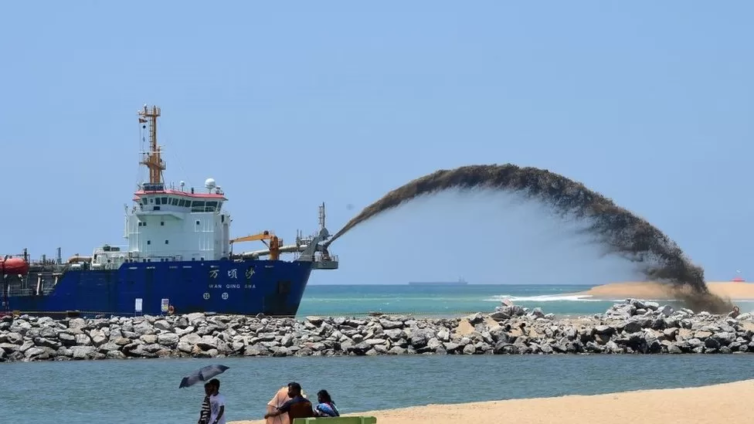
Audio By Carbonatix
Around six billion tonnes of sand is dredged from the world's oceans every year, endangering marine life and coastal communities, the UN says.
Sand is the most exploited natural resource in the world after water and is used to produce concrete and glass.
The UN Environment Programme (UNEP) said some vessels were acting as vacuum cleaners, dredging both sand and micro-organisms that fish feed on.
This means that life may never recover in some areas.
The new data coincides with the launch of a new analysis tool called Marine Sand Watch that monitors dredging activities using marine tracking and artificial intelligence.
"The scale of environmental impacts of shallow sea mining activities and dredging is alarming," said Pascal Peduzzi, who heads UNEP's analytics centre GRID-Geneva.
The new platform estimates that out of some 50bn tonnes of sand and gravel used by humanity each year, an average of six billion tonnes come from the world's oceans and seas.
This is the equivalent of "more than one million dump trucks every day", Mr Peduzzi said.
The marine environment must be given time to recover, he said, adding that "it's not sustainable".
Large vessels were "basically sterilising the bottom of the sea by extracting sand and crunching all the microorganisms that are feeding fish", Mr Peduzzi said.
Sometimes the sand is dredged to the bedrock, meaning marine life may never recover, he added.
The UNEP recommended that sand dredging should also be banned from beaches to protect coastal resilience and economies.
Sand is essential for constructing buildings, roads, hydroelectric damns and solar panels. It can also play an important environmental role, protecting communities from rising sea levels.
The South China Sea, the North Sea and the US east coast are among the areas where the most dredging has occurred, the report states.
Latest Stories
-
SUSEC–Abesim and Adomako–Watchman roads set for upgrade in Sunyani
24 minutes -
CDD-Ghana calls for national debate on campaign financing
60 minutes -
INTERPOL’s decision on Ofori-Atta: What it means for his U.S. bond hearing and the legal road ahead
1 hour -
Parties can use filing fees to cover delegates’ costs, end vote-buying – Barker-Vormawor
1 hour -
Boxing in Bukom: Five months without the bell
1 hour -
Political parties can end vote-buying by disqualifying offenders – Barker-Vormawor
1 hour -
Ministry of Gender investigates alleged sharing of intimate videos by foreign national
2 hours -
Cocoa must be treated as business, not politics- Nana Aduna II
2 hours -
Barker-Vormawor urges scrutiny of COCOBOD reforms, warns of continued debt burden
2 hours -
Prince Adu-Owusu: Beyond flowers and grand gestures — How do you want to be loved?
3 hours -
Multiple vehicles burnt as fuel tanker explodes on Nsawam-Accra highway
3 hours -
Former COCOBOD administration spent syndicated loans on themselves, not farmers – Inusah Fuseini
3 hours -
Mahama vows to end export of raw mineral ores by 2030, shifts focus to local processing
4 hours -
Mahama meets UN Chief, discusses African security & democracy.
4 hours -
Playback: Newsfile discussed cocoa crisis and election credibility in Ghana
4 hours

